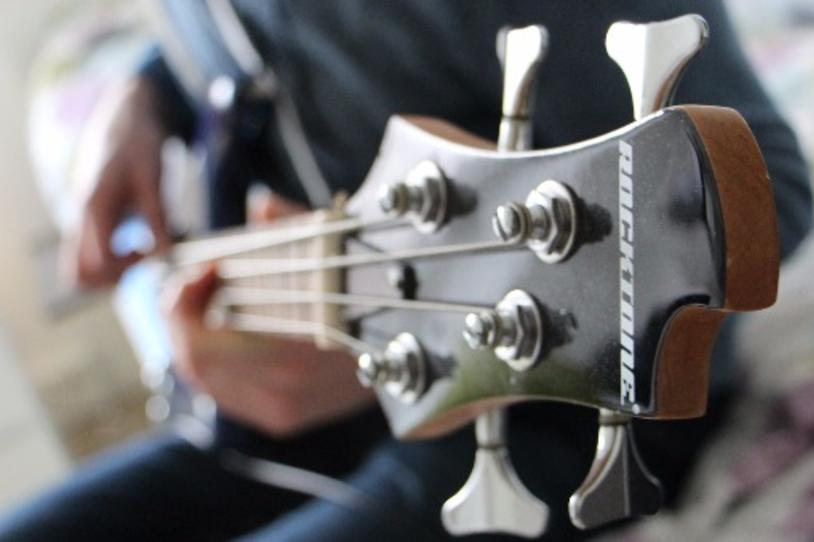
Music is powerful -- it moves us physically and emotionally, often transporting us back to a previous place and time. A foot will start to tap along to a beat or tears begin to well up in response to a touching melody. Far from just stimulating memories surrounding a song, though, many believe music can actually help to preserve and even enhance cognitive function.
Rhythm of Music and Mind
File this away for small talk or to use as a retort when someone declines your invitation to dance because they "have no rhythm." Every person -- or at least every brain -- does have rhythm. This pattern changes depending on the state of activity: increasing when you’re alert and focused and slowing when you’re sleepy.
In certain diseases, like Parkinson’s, the brain rhythm in the circuit controlling movement gets off track. Specific treatments work to restore normal rhythm: deep brain stimulation delivers electrical stimulations and a new device breaks a freezing episode by playing a rhythmic clicking in the ear.
Knowing we all have this inherent rhythm and that we all respond to music somehow, researchers have investigated the brain changes that occur when listening to and playing music. The emotional experience of hearing music can increase the release of dopamine -- the brain chemical lacking in Parkinson’s disease. People with musical training have better memory, executive function (planning, problem solving, organizing, etc) and visuospatial perception (ability to determine the relationship of objects in space). While playing music, multiple different areas of the brain are activated and in the long run, this leads to an increase in the volume and activity of the corpus callosum -- the bridge that allows communication between the two sides of the brain.
Can Music Mend the Mind?
What if you have no musical background or ability to carry a tune? What if dementia or Parkinson’s disease has already caused cognitive changes or movement difficulties? Can music help?
According to members of the 5th Dementia -- an unconventional group of musicians whose only requirements for participation include an interest in music and a diagnosis of Parkinson’s or dementia -- that answer is a resounding yes. Their twice-weekly jam sessions have brought about a remarkable transformation in each individual involved. Through the universal language of music, those who have trouble recalling a daily schedule or holding a conversation are able to communicate in a different manner, express their emotions and connect with others on a deeper level.
Irwin Rosenstein, who plays keyboard for the group, describes the music as giving him a purpose so that Parkinson’s and dementia don’t define him. He and his wife Carol founded the 5th Dementia and its parent organization, Music Mends Minds in 2014. Regarding the changes she’s seen in Irwin since then, Carol says "I think he’s much more alert. He’s much more interesting. His cognition has improved… We really were losing a connection, and he was really slipping away. And I can really say that he’s -- he’s back again."
Playing Music Is "a Full Body Workout for the Brain"
Playing music is a complicated undertaking that engages multiple areas of the brain simultaneously. In essence, it’s the definition of multitasking. Translating black and white symbols into pleasing sounds requires:
- fine motor movements and an intact sensory system to manipulate an instrument,
- immediate processing of visual and auditory elements of a melody,
- mathematical precision and internal rhythm to keep tempo,
- emotional interpretation of the sound, and
- coordination with other performers.
Playing music exercises the mind and body. It provides a route for social interaction. In drawing someone into its rhythm, it can calm a resting tremor, break a freezing spell and bring gait into a more normal pattern. Music can boost memory, lessen depression, and improve the volume and tone of speech. It’s no wonder some say music is magical.
Make Your Own Music
You don’t have to have any musical training or talent to participate in music therapy. The leader of 5th Dementia says there are "no wrong notes" and their website states that the only possible side effect is "happy memories." Although the 5th Dementia is based in Los Angeles, music therapy is widely available. You can find a music therapist in your area through an online search or talk with your doctor or support group for other recommendations. If no opportunities for formal participation in a band are available, consider singing in the church choir, reaching out to a local music school or picking up your own instrument at home.
Read the People Magazine article on the 5th Dementia.
Watch the PBS NewsHour story on the 5th Dementia.
Ask the MD has been made possible through the leadership of members of our Parkinson's Disease Education Consortium in conjunction with The Albert B. Glickman Parkinson's Disease Education Program. These partners' support allows us to furnish high-quality educational content to the Parkinson's community while maintaining our commitment to allocate donor dollars to high-impact research. Editorial control of all Michael J. Fox Foundation-published content rests solely with the Foundation.
